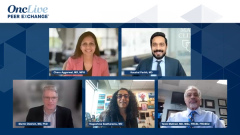
Investigational Avenues in Uncommon EGFR Mutations: NSCLC Treatment Insight
Experts share treatment experiences with osimertinib and afatinib, the potential role of immunotherapy, and ongoing investigations with ADCs and emerging TKIs for patients with uncommon EGFR mutations.
Episodes in this series

Transcript:
Charu Aggarwal, MD, MPH: Dr [Martin] Dietrich, when patients are referred to you from the community with uncommon EGFR mutations, are they usually on EGFR TKIs [tyrosine kinase inhibitors]? What has your experience been?
Martin Dietrich, MD, PhD: I think the uncommon EGFR mutations typically, in the absence of clear guiding data, oftentimes follow the clinical experience and the guidelines to favor osimertinib over afatinib. They're both NCCN [National Comprehensive Cancer Network] preferred agents in the uncommon mutations. Osimertinib just brought a lot of comfort with regard to adverse effects. Even if we can't really say that one agent is more efficacious than the other, I think we have a pretty good understanding that osimertinib’s brain activity and adverse effect profile is better. I do want to say that while the EGFR uncommon mutations have different binding capacities and to a certain degree, different biological receptor functions, they share a great deal of biological overlap. So while we are not necessarily sure what the ideal treatment or the ideal treatment sequence is, it's very certain that we will have to lean on the commonalities between common and uncommon mutations for both first-line and subsequent lines of treatment. So typically, the experience for me is that osimertinib is probably the preferred agent based on the NCCN guidelines.
I think coverage is given there, but afatinib the approved agent and the data are better. They've done certainly a great deal of work in making this more tolerable with those adjustments. So, I think you have 2 good options there. Again, we don't really know what the optimal sequence is. I did want to add to the discussion earlier about the subsequent treatments, obviously, to Dr [Tarek] Mekhail criticism of not applying to uncommon mutations. We've seen some very nice responses to osimertinib, even in the absence of T790 mutations. So, I think this might be even an option in all common second-line populations, obviously not specifically approved here either, but just to give the full spectrum of a very difficult-to-treat disease space of options in the second-line setting.
Charu Aggarwal, MD, MPH: Absolutely. Dr [Nagashree] Seetharamu, talking about different treatment options, is there a role for immunotherapy in the management of such patients?
Nagashree Seetharamu, MD: Wow, tough question. Anecdotally, before I have seen responses, again, at a case report level, there are reports to categorically say that these patients don't respond to immunotherapy may not be the right statement. Who are the patients that would benefit from immunotherapy is something that we need a lot more information on. But I wouldn't rule it out. It definitely wouldn't be my first-line option; it would be something down the line that I might consider for these patients. Have I seen increased toxicity given that these patients have been exposed to TKI in the past?
Yes, but no one really went to a grade 4 or grade 5. So I think it is manageable as long as your patients are aware of it and reporting it in a timely fashion. So I wouldn't rule it out because this space is a highly unmet need and I think we need to use all the resources. So, I have done it.
Charu Aggarwal, MD, MPH: That's interesting to hear. I think especially as you move along the treatment pathway and you're left with very few options, I think it behooves us to sort of think about these. But I think going from a TKI to immunotherapy may be much more palatable as has been done in situations such as, for example, IMpower150 [NCT02366143], then the other way around to go from immunotherapy to TKI and I certainly think that there may be some role, although not always in the management of such patients. Dr [Tarek] Mekhail, are there other investigational agents you wish to highlight for the patients that we have been talking about with uncommon EGFR mutations?
Tarek Mekhail, MD, MSc, FRCSI, FRCSEd: So back to the comment, I did not mean to be critical at all of Dr Martin Dietrich, he actually did a very nice review of all the recent data. I just wanted to make sure, again, stand corrected if I'm wrong that the MARIPOSA [NCT04487080], and the CHRYSALIS [NCT02609776] did not include the sensitizing mutations. But going forward, I agree with you 100 % on the ADCs [antibody-drug conjugate] and these patients. I am not totally sure there are any other exciting clinical trials. As you know, there is a furmonertinib, which is a new TKI from China. We have the clinical trial open still in the dose escalation phase and it showed some responses in patients with uncommon mutations.
And I do believe that they are included. The exon 20 insertion is where the excitement is with the recent presentations at ASCO [American Society of Clinical Oncology Annual Meeting] with osimertinib, which actually fits into a need. I think the CNS [central nervous system] disease in these patients is defeated. I can't wait for this particular drug given the CNS. The reason I say that is that my last patient before this conference was a patient with exon 20 insertion and I'm trying to address how to treat them. But again, I think I have a lot of hope for the ADCs.
Charu Aggarwal, MD, MPH: Very well said. And there's just so much more data to come. We have all been enrolling patients in these clinical trials. I think we talked a lot about the importance of biomarker testing, recognizing these patients, talking about them, and really thinking about them in different ways, not just specific exon-based mutations, but also structure-based mutations.
Transcript edited for clarity.





































